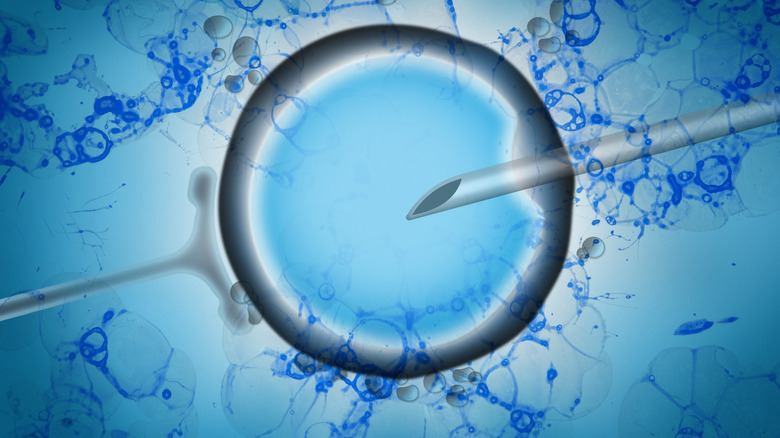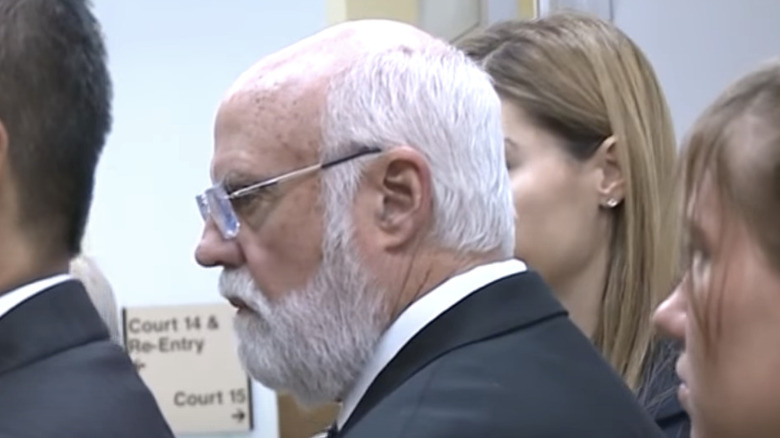Why Wasn't Dr. Donald Cline From Netflix's Our Father Charged With Fraud?
When it was found out what Indianapolis-based fertility specialist Dr. Donald Cline had done, the crimes he had committed were apparent — or so one would think. In the early days of Cline's clinic he used his own semen to help women conceive through IVF, without their knowledge that he was the donor. Sperm used in such treatments would typically come from a donor bank. Cline was only found out when one offspring of a former patient took an at-home commercial DNA test many years later. Not only did she match with several children born from Cline's clinic as half-donor siblings, she matched with Cline, according to Glamour.
Clearly, Dr. Cline had done something wrong — but what was it exactly? His actions failed to meet strict legal definitions of rape in Indiana or elsewhere, nor was there another sexual impropriety he could be charged with. Could it be medical malpractice, or possibly fraud? Cline, who had retired by the time his secret was exposed, had his medical license revoked permanently and was slapped with a $500 fine, as well as $185 in court fees (via Indianapolis Monthly). He was charged with none of the aforementioned crimes, though, and he never went to jail. To face any consequences at all, prosecutors had to cast a wider net. As a result of the case, some fertility laws have now changed.
Cline fathered at least 50 children
Once Jacoba Ballard, the daughter born from one of Cline's former patients, matched with Cline in her at-home DNA test, she began to investigate what might have happened. What she uncovered were at least 50 children born from Cline's IVF treatments. According to Newsweek, at least 94 children have been discovered as of 2022, though there may be more. At the time that Cline first went into practice, semen donation was relatively new and not very well regulated. Today, sperm donation is common and regulated by the U.S. Food and Drug Administration. Donors are now screened for medical history, according to Endocrine News.
Worldwide, sperm donation is more and less regulated in certain areas. In the United States, though, there are no limits on how many times a person can donate, and remaining anonymous remains the personal choice of the donor, as the National Law Journal explains. The fact that American men who donate sperm could father an unknown number of children remains controversial. In the wake of Cline's case, though, Indiana passed a bill to protect patients from what Cline had done, and several more states have followed suit.
What Cline had done was not technically illegal
Dr. Donald Cline was not convicted with fraud or medical malpractice at the time he stood trial because, in the eyes of the law, he had done nothing illegal. Prosecutors charged Cline with obstruction of justice, instead. When Cline, nearly 80, was first accused, he denied the charges. He was later found out to have lied. In addition to his permanent ban from medicine and a fine, Cline was given a one-year suspended sentence. Although Cline only received a slap on the wrist in the opinion of some, his case did draw attention to how little recourse consumers had at the time in cases like these.
As a result, the Indiana Fertility Fraud and Deception Bill was passed, signed by Governor Eric Holcomb, according to The Atlantic. Under the new legislation, what Cline had done was now considered fraud, and any medical professional who misrepresented a procedure, which might include the introduction of a device, drug, or reproductive material without a patient's consent, were now liable. Many states have passed similar fertility legislation although more work remains in some areas.
The story of Dr. Cline is told in the documentary "Our Father," available to stream on May 11 on Netflix. An "Our Father" trailer is available to view now on YouTube.


